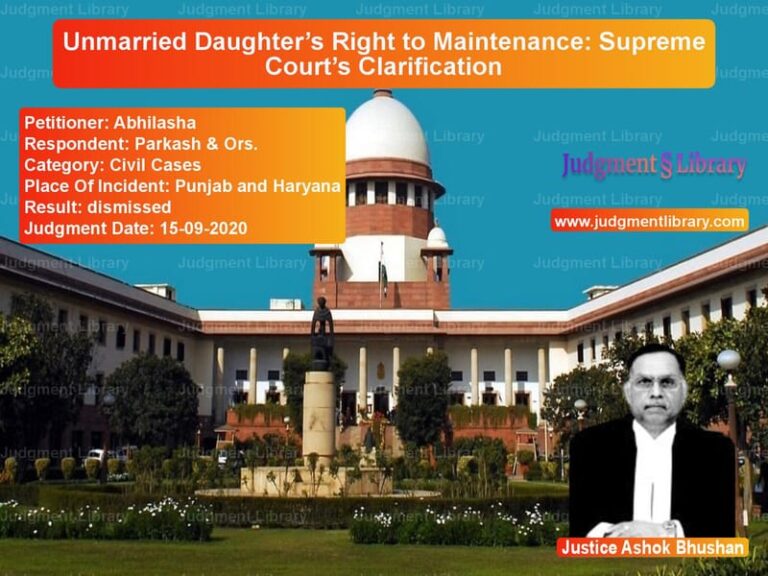Supreme Court Cracks Down on Capitation Fees in Private Medical Colleges
The case of Rashtreeya Sikshana Samithi Trust vs. Committee for Fixation of Fee Structure of Private Professional Colleges & Others revolved around the persistent issue of capitation fees in private medical colleges. The Supreme Court took a strong stance against this practice, directing regulatory bodies and state governments to implement stringent measures to curb such illegal fee collection.
Background of the Case
The issue of capitation fees in private medical colleges has been a long-standing concern in India. Despite multiple judicial interventions, the practice of charging excessive fees beyond the prescribed limit continued in many states. The dispute in this case originated from the orders passed by the Fee Fixation Committee for undergraduate medical courses for the academic years 2004-2007. Both students and private medical colleges challenged these orders in different capacities, leading to multiple litigations in the High Court.
The High Court ruled in favor of the students, directing the refund of excessive fees charged. The private medical colleges, however, challenged this decision in the Supreme Court. The matter eventually evolved into a broader discussion on the need for stricter enforcement of regulations to eliminate capitation fees altogether.
Key Legal Issues
- Whether private medical colleges were justified in charging fees beyond the amount fixed by the Fee Fixation Committee.
- Whether the existing regulations were sufficient to prevent capitation fees.
- What further measures were necessary to ensure compliance with previous court rulings against capitation fees?
Arguments Presented
Petitioners’ Arguments (Private Medical Colleges)
- Private institutions require additional funds beyond the prescribed fees to maintain quality education and infrastructure.
- Students willingly pay extra fees to secure admissions, which should not be categorized as illegal capitation fees.
- The state-imposed fee regulations unfairly limit the financial autonomy of private institutions.
- Many institutions do not charge capitation fees, and a blanket ban unfairly penalizes compliant colleges.
Respondents’ Arguments (Committee for Fixation of Fee Structure & State Governments)
- The charging of capitation fees violates the Supreme Court’s earlier rulings in TMA Pai Foundation vs. State of Karnataka and P.A. Inamdar vs. State of Maharashtra.
- The regulation of fees is essential to ensure transparency and prevent the commercialization of medical education.
- Allowing institutions to charge fees beyond the fixed limit creates a barrier to education for meritorious but economically weaker students.
- Stronger enforcement mechanisms, including public reporting platforms, are required to prevent illegal fee collection.
Supreme Court’s Observations
The Supreme Court examined multiple reports, including an interim status report by the Amicus Curiae, which highlighted the prevalence of capitation fees despite existing laws. The Court made the following key observations:
- Capitation fees undermine educational integrity: The Court reiterated that private institutions must operate transparently and should not exploit students financially.
- Fee Fixation Committees must be empowered: The Court emphasized that state regulatory bodies must ensure strict compliance with fee structures.
- Technology should be leveraged for transparency: The Court directed the creation of a public grievance web portal for students to report instances of capitation fees.
- States must take proactive measures: The Court ordered state governments to publish helpline numbers and conduct awareness campaigns against capitation fees.
- Private colleges must not demand full course fees upfront: The Court noted that requiring students to pay fees for the entire duration of the course in advance is unfair and should be regulated.
Key Excerpts from the Judgment
The Supreme Court strongly condemned capitation fees, stating:
“In spite of repeated directions issued by this Court to stop the menace of capitation fee, the hard reality of charging exorbitant capitation fee is very much prevalent.”
Further, the Court observed:
“A rational model should be adopted by the management, which would not be entitled to charge a capitation fee. Appropriate machinery can be devised by the State or university to ensure that no capitation fee is charged and there is no profiteering.”
Final Verdict
The Supreme Court issued comprehensive directions to curb capitation fees, including:
- The creation of a web-portal under the Supreme Court’s oversight for students to report complaints.
- Mandatory publication of helpline numbers and complaint mechanisms in newspapers and admission documents.
- Strict regulation of fees by state Fee Fixation Committees, ensuring no additional charges beyond prescribed limits.
- Ban on cash payments for fees to improve transparency and accountability.
- Private medical colleges were prohibited from demanding advance payment for the entire course duration.
Outcome: The ruling reinforces the judiciary’s stance against the commercialization of education and ensures greater transparency in medical college admissions.
Petitioner Name: Rashtreeya Sikshana Samithi Trust.Respondent Name: Committee for Fixation of Fee Structure Of Private Professional Colleges & Others.Judgment By: Justice L. Nageswara Rao, Justice B. R. Gavai.Place Of Incident: India.Judgment Date: 19-05-2022.
Don’t miss out on the full details! Download the complete judgment in PDF format below and gain valuable insights instantly!
Download Judgment: rashtreeya-sikshana-vs-committee-for-fixati-supreme-court-of-india-judgment-dated-19-05-2022.pdf
Directly Download Judgment: Directly download this Judgment
See all petitions in Consumer Rights
See all petitions in Education Related Cases
See all petitions in Judgment by L. Nageswara Rao
See all petitions in Judgment by B R Gavai
See all petitions in allowed
See all petitions in supreme court of India judgments May 2022
See all petitions in 2022 judgments
See all posts in Civil Cases Category
See all allowed petitions in Civil Cases Category
See all Dismissed petitions in Civil Cases Category
See all partially allowed petitions in Civil Cases Category







